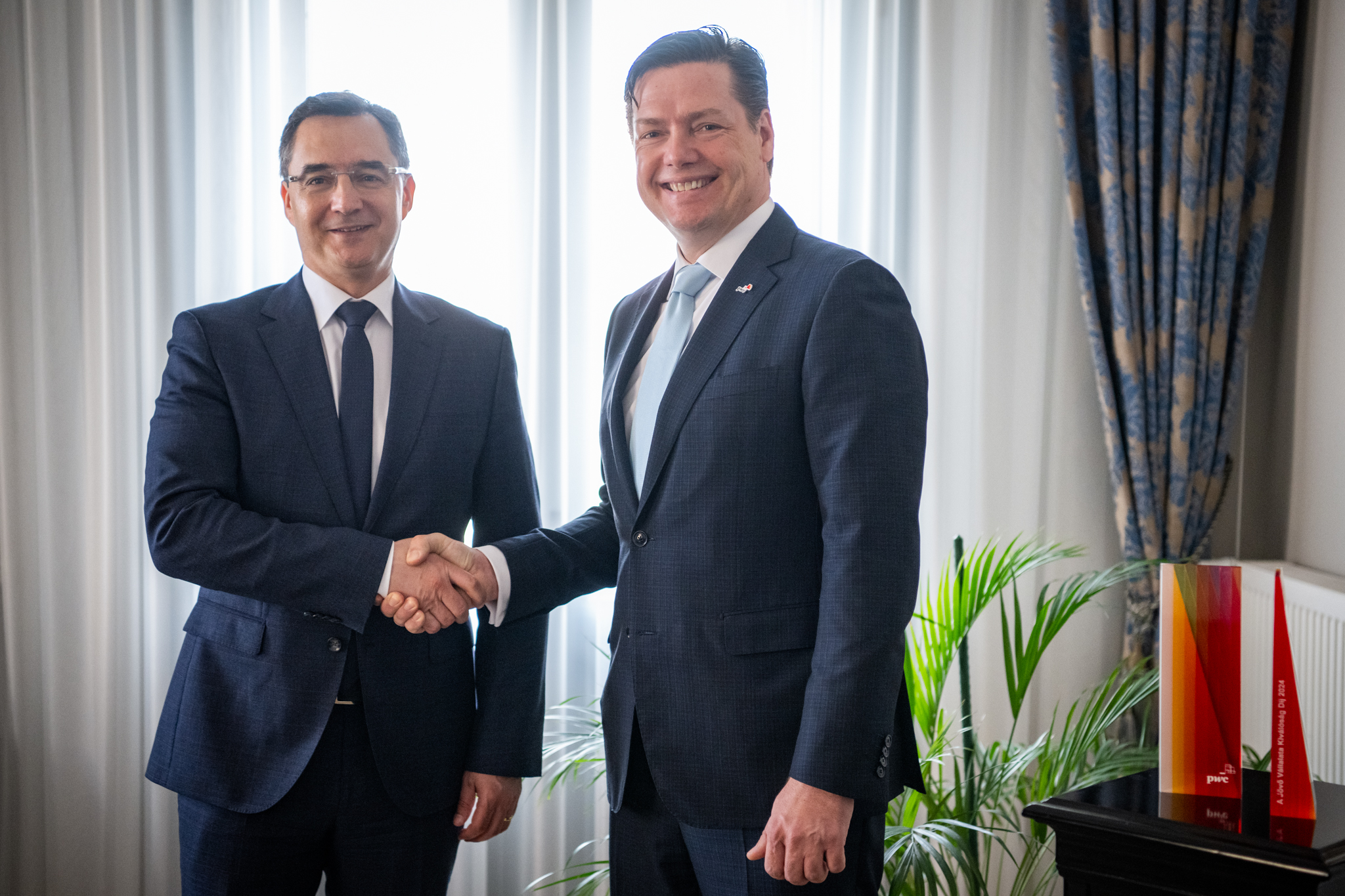Infant venture capital: Interview with Péter Oszkó, Chairman-CEO of PortfoLion Venture Capital

After 12 years of advisor career at Deloitte Dr. Péter Oszkó, lawyer by trade, joined the crisis manager government of experts to become the Finance Minister of PM Gordon Bajnai. Following the 2010 elections Dr. Oszkó returned to the private sector and today he is CEO of PortfoLion Venture Capital Fund Management Co. PortfoLion, as a member of the OTP Group, a leading Hungarian and regional financial institution
Is venture capital and private equity mature enough in Hungary?
In Europe, private equity and venture capital has a smaller share of the financial market than in the United States, which is a weakness. Private equity helps to finance enterprises via the special structure of ownership, which offers a lot of projects based on development and innovation. Hungary is even weaker than Western Europe; the sector has not grown from its infancy. Some pioneering actors tried to change this situation very early on, but a few fund managers cannot guarantee a total breakthrough unless they act in the supporting ecosystem of this sector. We need the critical mass of private equity participants and tools to break through. The EU recognized this burning need so the JEREMIE funds were born to change the momentum and to create this ecosystem.
How open are the project owners?
Since the JEREMIE and eight simultaneous funds started their operations, more and more projects pop up. Startup conferences and competitions prove that the number of projects is ever growing. We can boast that there is strong enough intellectual capital in this country. However, when we consider management abilities, company development and related business skills, the situation worsens. The market is underdeveloped. Biotech experts and engineers have not yet shown any interest in company development, but have relied on state and EU subsidies and tenders. They have studied how to write a tender and how to answer the administrative requests of an assessment, but not how to meet the market’s needs.
Is there any reason for optimism?
It is too early; we are only a one-and-a-half-years-old company. I am satisfied with the initial period as the first months always present the major challenge to these investments. The companies need four to five years to show their potential. Some have proved to be ‘adult’ and operate on their own, while others need more support. So the time has not yet come to sit back with satisfaction. In macro-economical terms we can talk about a success story, as JEREMIE managed to secure finances for these companies. However, the true success remains a question of the future.
What other sources can PortfoLion use besides JEREMIE?
Private ones. Right now, we have to admit, the region does not attract too many investors, and this is not only due to the crisis. Just take a look at the yields of the last 20 years; they all converge on zero. European funds show scary results; nevertheless, there are huge differences among fund managers. In Hungary, nobody has succeeded yet with a permanently well-performing fund. Experts do not blame fund managers; they rather agree that the market has not been capable of offering more opportunities. LogMeIn or Prezi have been exceptional successes on the Hungarian market, when a brilliant project owner with an innovative mind found a co-owner and investor with the proper network and management know-how. Beyond them, a list of an additional 20 success stories could not be compiled.
In the environment created by JEREMIE the situation is much better. According to the program, it guarantees 70% of the investment but requires only a basic interest in return, not the yield corresponding with the whole share. [Market investors always negotiate for a higher percentage, at least the proportion of their investment – Ed.] Whatever the investor of the remaining 30% can make above this basic rate can be gathered. So JEREMIE says forget the yields that you had to harvest individually, I guarantee you a good return of your investment. Suddenly, even a mediocre yield offers a great profit, so it triggers more interest from those who previously refused to be involved. Whether it will meet expectations we will find out only when the funds close their projects. At the moment JEREMIE is working extremely well.
That is the inspiring part of the involvement of a central government. But there are also regulations, like the EU’S AIFM directives.
Well, AIFM projects the paranoia that evolved in the financial crisis on to private equity. It has saddled the industry with the heavy burden of administration. Nevertheless, Hungarian regulations, quite strict ones, already included them, just like the JEREMIE regulations, so AIFM has not deeply affected the Hungarian market.
It is rather the general environment that affects the market. Not more than 45 enterprises were reached by the new funds and programs and they do not depend on local developments. The companies of our portfolio are mostly interested in regional and global markets. The local market is small, and we have a huge debt to pay, so there is very little chance offered for a company to become successful within its borders. Venture capital always keeps its distance from gloomy risks.
If the market and especially its players are still living through their early years and innovative project owners, particularly the older generation, need more understanding, education is a must. What efforts are being made by the sector?
Certain universities run courses on the topic, but the education is in its infancy too. We are happy to see that the Central European University is planning to start a major incubation system. The market lacks an incubation system. We are also happy to support these efforts, as our company will benefit from the arrival of new projects and opportunities that do not require yearlong preparation before the actual investment. Meanwhile, interest has grown tremendously. We receive invitations from universities to give courses on the topic and graduating students are looking for the chance to join the profession.
Does PortfoLion or any private equity organization plan an institutionalized educational program?
I have no knowledge about any such effort. Today the time dedicated for extra work is very limited. A fund is financing its professionals and managers, those, who start the engine of investments before money is earned from successful projects closing. For us OTP Bank is a solid base, but still, payroll is sensitive. Some of my colleagues and I do intend to develop the market, but our opportunities are limited. A university or a state-sponsored institute must have better resources and if our expertise were invited, we would willingly support them.
Where does PortfoLion raise additional sources for its funds?
OTP is a major regional bank and helps to extend the opportunities beyond the borders of JEREMIE. It helps to persuade other institutions to join. Our ambition is to create more different funds, so they concentrate on different segments of the investments and a variety of market sectors. These efforts are in progress, this year we are planning to start one or two more funds.
These two funds will definitely start?
One of them is an accepted project by OTP and the Hungarian Financial Supervisory Authority is just running the approval process. It will support so-called turn-around investments, when a well established company is targeting a stable market segment, but its credit is deteriorating and therefore its growth potential is still limited. We will help them by raising their capital. According to our plans, this fund will open this year.
Your company is mostly interested in innovative projects. Meanwhile you are classifying projects by their maturity. What are the proportions?
We have decided to support innovative products. Considering maturity our portfolio can boast a rather colorful palette. Some of the companies earned HUF 2-300 million annually when we invested. The proportion of young to mature companies approaches 50-50%.
Does the OTP brand help?
To earn the appreciation and trust of the targeted companies, it definitely helps. Besides the rich opportunities of investments, it supports the fight against suspicion. Those who seek this financial support will face very harsh growth requirements. A private equity investor does not have any guarantee that his or her investment will surely return. Therefore a private equity investor requires ownership and management roles in the framework of a contract as a guarantee, but a project owner may feel that his company is just being taken away. Until that moment nobody else told him what to do, now an investor comes along and gets involved in everything... which is actually not even true, as an investor only wishes to get involved in issues that belongs to his or her field. Under the OTP brand, this suspicion becomes less grave.
How often do you mention the business know-how of the private equity managers as an asset besides the money the company can receive?
Always. Considering money, the very same offer and numbers could be received from other funds. Therefore the real competition is about additional values, like the know-how, management support, a strong board. Even opening a major investors’ consortia could be an important advantage, and other doors open thanks to the fund managers.
A final question, out of the private equity box: would you take a government position again?
The question is too general. I will not take one in the short-term. I wish to build a full investment success story, just as I did as an advisor earlier at Deloitte. I feel that before becoming the finance minister of the Bajnai administration in 2009 I had finished and therefore did not interrupt my advisor career. This time I have the same ambition in private equity.
SUPPORT THE BUDAPEST BUSINESS JOURNAL
Producing journalism that is worthy of the name is a costly business. For 27 years, the publishers, editors and reporters of the Budapest Business Journal have striven to bring you business news that works, information that you can trust, that is factual, accurate and presented without fear or favor.
Newspaper organizations across the globe have struggled to find a business model that allows them to continue to excel, without compromising their ability to perform. Most recently, some have experimented with the idea of involving their most important stakeholders, their readers.
We would like to offer that same opportunity to our readers. We would like to invite you to help us deliver the quality business journalism you require. Hit our Support the BBJ button and you can choose the how much and how often you send us your contributions.









